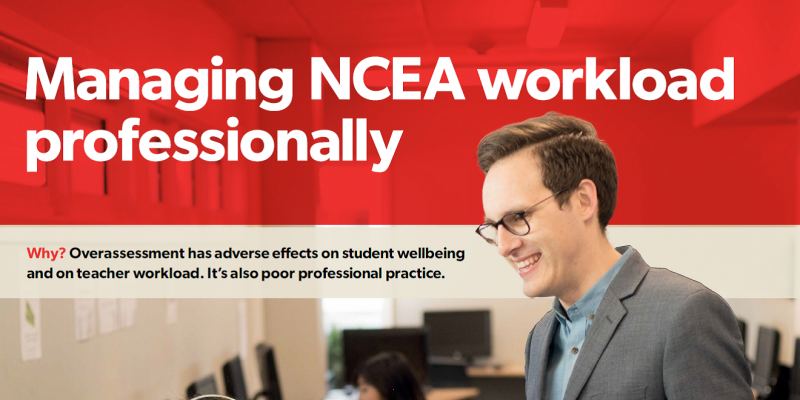
Over-assessment of NCEA students
NCEA workload was the biggest topic of the 2016 Workload Working Group which included as parties the Ministry of Education, PPTA, NZQA, ERO, STA, Education Council and principal representation.
Agreed key recommendations
- The ministry to consider reducing the number of credits at level 1 (which will be discussed as part of the coming NCEA review)
- The parties engage with schools about overassessment as not being conducive to wellbeing, reducing the maximum number credits offered and focussing on assessment in year 12 and 13 and not in year 11. (Schools could continue to assess at level 1 - which would be appropriate for some in year 12 - but not at year 11.
- The production of resource and information – high quality web based resources, and a pan-organisation poster on workload and how it can be reduced.
- The production of joint advice and guidance on the principal’s nominee role. The best way to manage teacher and student workload is to teach more and assess less, not assessing everything and only assessing when the bulk of students are ready. This helps to avoid having to offer reassessment.
Teaching more and assessing less
The best way to manage teacher and student workload is to teach more and assess less, not assessing everything and only assessing when the bulk of students are ready. This helps to avoid having to offer reassessment.
NZQA is highlighting information that will help to stop over-engineering and is now including comments in its MNA reports if schools are over-engineering practice. They have undertaken to make sure their website material makes clear what is required and expected and that people understand what ‘sufficiency’ of moderation means.
- Schools are only able to offer one reassessment of a standard, and that only after further teaching has taken place.
- There is no requirement to stick to a published timetable of assessments. The absence of rigid timetables would mean less need to reassess because the assessment of students will occur when they are ready.
- Schools should avoid publishing a definitive list of the standards against which students will be assessed. They can indicate what standards may be assessed and then according to their students interests and progress they might do some of the list of assessments but not others or even some not on the list.
- Schools should not be asking for evidence at points in time that students have a particular number of credits and should not pressure teachers when students are not amassing them. It is driving teachers into assessing when students are not ready or looking for empty credits.
- Credit farming should be discouraged. Competition between schools and between subjects in schools which leads to credit inflation. League tables feed into this. We are seeing increasing cheating and parents putting pressure on kids to get maximum credits.
- Schools can be frank with their school community about the impacts of overassessment and credit farming and point to student welfare statistics.
- Schools should avoid pushing assessment down into years 9 and 10.
Leadership from principals and senior leaders can have a big influence
Getting acceptance for less assessment requires leadership from principals and senior leaders can have big influence. It can be achieved in different ways, for example:
- The Wellington Girls High School parent education programme on the risk of over assessment has helped significantly cut back assessment.
- Counties Manukau and Hawke’s Bay principals trying to get a coordinated approach to reducing assessment.
Posters and programmes
The organisations have worked together to produce a poster that conveys the major recommendations. It will be large, with multiple copies for display around the school. The poster is one part of getting different ideas out there from the Education Council, from NZQA, from STA and from the ministry as well as PPTA as a step towards a culture change.
NZQA has a Transforming Assessment Praxis (TAP) nine-week online programme, aimed at modifying existing resources to better meet the needs of learners, and exploring diverse and valid ways of collecting evidence. It requires 90 minutes each week. The intention is to effect a change of assessment practice and will show how to integrate standards to reduce workload. It costs $120.
There are also best practice workshops operating. These are working well and schools are encouraged to take them up. NZQA is offering more support if you are in a region with few teachers, e.g. teleconferencing
Resources
NZQA Transforming Assessment Praxis 2017 programme (nzqa.govt.nz)
National Certificate of Educational Achievement (NCEA) - PPTA advice (ppta.org.nz)

